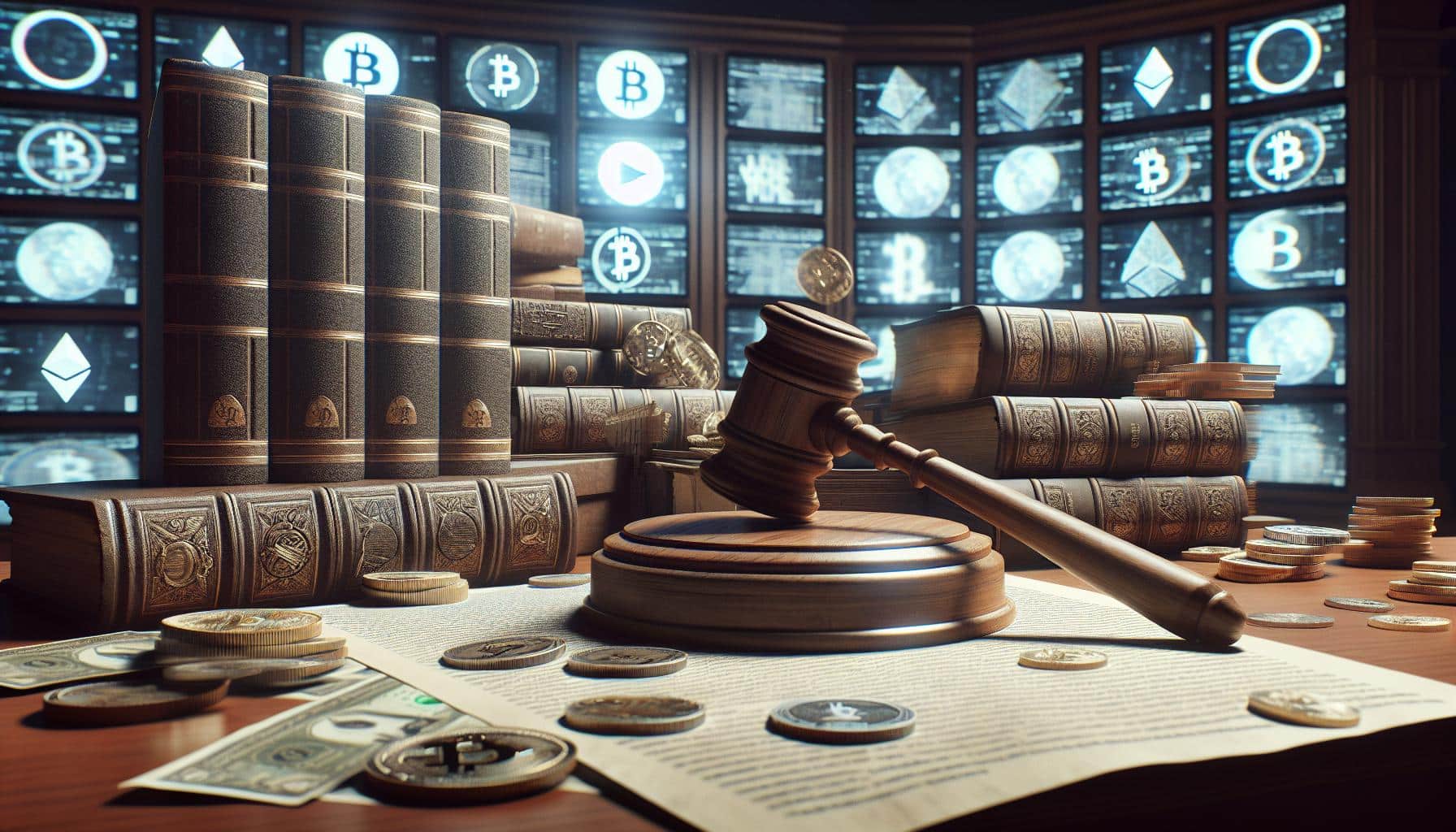Unveiling the XRP Lawsuit: Impacts & Insights
You’re no stranger to the world of cryptocurrencies, where volatility is the norm and legal controversies are par for the course. Yet, even within this unpredictable landscape, the ongoing saga of Ripple’s XRP lawsuit has captured your attention. It’s a high-stakes legal battle that could redefine the future of digital assets.
As you delve into the latest developments, you’ll find that this isn’t just a story about a single lawsuit. It’s a story of regulatory power, the evolving definition of cryptocurrencies, and the precarious balance between innovation and oversight. Buckle up, as we navigate the twists and turns of this ongoing court case that has the potential to shape the future of the crypto industry.
Overview of the XRP Lawsuit
The XRP lawsuit has established a compelling turn of events in the realm of digital currency. This intricate legal battle pulls into focus the regulatory standing of cryptocurrencies such as XRP, potentially redesigning the future landscape of the market.
Reasons Behind the Legal Battle
The underpinning conflict stems from the U.S. Securities and Exchange Commission (SEC)’s claim that XRP tokens are, by definition, securities and, therefore, fall within their jurisdiction for oversight. According to the SEC’s assessment, Ripple’s sale of XRP tokens equates to a securities offering without the appropriate registration or exemption. Ripple refutes this claim, arguing XRP’s functionality as a currency invalidates it as a security.
Major Parties Involved in the Lawsuit
This tussle involves three key players, notably Ripple Labs Inc., the company behind XRP, co-founder Chris Larsen, and CEO Brad Garlinghouse. The SEC stands as the instigator of the lawsuit, asserting allegations that Ripple’s operations involving XRP infringe on securities laws. Amid this lawsuit, the XRP news has been observing this unraveling situation, covering the ripple effect generated throughout the crypto industry due to the ongoing litigation.
Impact of the Lawsuit on XRP Trading
The ripple effect of the SEC lawsuit against Ripple Labs is undeniable. It’s profoundly disrupted XRP trading, sending waves through crypto markets and impacting Ripple’s operations. Let’s delve into the specifics of these impacts.
Reaction of XRP Markets
Not surprisingly, XRP markets reacted adversely to the lawsuit news. Immediately following the SEC’s announcement, numerous crypto exchanges across the globe struck XRP off their trading lists. As a result, XRP trading volumes dwindled, resulting in a steep fall in its market value. On December 22, 2020, XRP traded at $0.57. Fast-forward to just two weeks later, and it had plummeted to $0.21 as reported by crypto fintechzoom login data. This represents a staggering 63% drop.
The ripple effect extended beyond mere numbers. The lawsuit stirred uncertainty among traders and investors, leading to a loss of confidence in XRP. Given the potential ramifications of the suit, many preferred to err on the side of caution, contributing further to the asset’s reduced value.
| Date | XRP Trading Value |
|---|---|
| December 22, 2020 | $0.57 |
| Two weeks later | $0.21 |
Ripple’s Response to the Lawsuit
Ripple was quick to respond to the SEC lawsuit, posting a preliminary statement on their official blog. The company challenged the SEC’s classification of XRP as a security. They emphasized XRP’s primary function as a virtual currency, noting its extensive use for international transactions by financial institutions.
Ripple Labs, along with co-founder Chris Larsen and CEO Brad Garlinghouse, dismissed the SEC’s allegations as an attack on the entire crypto industry. They argued that regulatory ambiguity offers an unfair advantage to Bitcoin and Ethereum, the only two digital assets exempted from US securities laws according to the SEC’s stance.
As part of their defense, Ripple disclosed their intention to fight the SEC’s allegations in court. They continue to refute the claims made against them, asserting their commitment to establish regulatory clarity for the future of the cryptocurrency industry. The unfolding case has reinforced the contentious issue of cryptocurrency regulation, serving as a potent reminder of the maturing and evolving landscape of digital assets.
The SEC lawsuit has had significant consequences on XRP trading and Ripple’s operations. The case continues to unfold, and the final outcome – whichever way it swings – holds the potential to etch a new precedent in crypto regulation. The stakes are high, and like much of the world, we’re keenly observing the developments.
Key Developments in the XRP Lawsuit
Dive deeper into the pivotal developments and their influences on the XRP lawsuit.
Court Hearings and Decisions
Several court hearings and decisions have been instrumental in shaping the trajectory of the XRP lawsuit. In one notable instance, Judge Sarah Netburn granted Ripple’s motion to compel the Securities and Exchange Commission (SEC) to produce documents related to Bitcoin and Ethereum, two cryptocurrencies the SEC had previously declared not to be securities. By doing so, the court sought to discern how the SEC differentiates between cryptocurrencies that it deems as securities, such as XRP, and others it doesn’t, setting new prescendents in crypto regulations.
Further, in a victory for the Ripple team in March 2021, the court ruled that personal financial records of Ripple’s executives aren’t relevant to the lawsuit, rejecting the SEC’s request, and further distanced XRP from being classified as a security. Each judgment in these court hearings provides critical insights into the legal-standing of XRP in the ever-evolving landscape of digital assets.
Settlement Negotiations and Their Outcomes
Settlement negotiations have, too, significantly impacted the lawsuit’s direction. While both parties have mentioned the possibility of settlement discussions-as noted in a court letter by their lawyers-no significant breakthroughs have occurred as of yet. Analysts, however, speculate that a settlement could possibly revolve around agreeing on XRP’s status and its future regulatory treatment.
Stakeholders continue to monitor these events closely as the outcome of this lawsuit holds the potential to significantly influence the future of cryptocurrency regulation. Just as previous rulings have impacted crypto news regarding XRP, these settlement negotiations could yield revolutionary results that change the dynamics of crypto trading significantly.
Implications of the Lawsuit Outcome
The lawsuit’s resolution extends its impact beyond the courtroom, permeating into Ripple, XRP holders, and the larger cryptocurrency market. The development fundamentally rebooted perspectives on digital assets.
Impact on Ripple and XRP Holders
Ripple continues to bear the brunt of the lawsuit’s shockwaves. The creators found themselves battling not only for their digital token’s classification, but also its survival. Since the SEC’s actions, XRP’s market value nosedived, thrusting Ripple and its stakeholders into financial turbulence.
Despite this setback, Ripple was dogged in their defense. Ripple pushed back, emphasizing XRP’s integral role in facilitating international transactions. Imagine a scenario where Ripple emerges victorious from the lawsuit. The company’s reputation and the market value of XRP could strongly rebound. If the court were to rule in favor of the SEC, XRP is likely to face a regulatory crackdown, hampering its utility and tarnishing Ripple’s image.
The lawsuit deals an even harsher blow to XRP holders. When prices plummeted post-lawsuit, XRP holders faced unprecedented losses. Given this ordeal, the lawsuit’s outcome carries profound significance for XRP holders. If Ripple wins, the price of XRP might rocket upwards. In the event of a loss, however, any remaining value in XRP could shockingly nauseate and potentially lead to its exclusion from major exchanges.
Broader Implications for the Cryptocurrency Market
However, the effects of this lawsuit ripple out towards the broader crypto sphere. Interested parties closely follow the crypto news on Fintechzoom and other platforms, awaiting XRP updates and predictions. Pertinently, the lawsuit has unearthed grey areas in cryptocurrency regulations. If the SEC emerges victorious, other token creators could find themselves in hot legal water, causing turbulence in the wider crypto market.
Conversely, a Ripple win could spell a paradigm shift in crypto regulations. The precedent could safeguard other cryptocurrencies from similar regulatory actions, setting a precedent for digital asset classification. In effect, regulators could be compelled to develop more nuanced frameworks for cryptocurrencies, sparking potential reforms in legislation.
Reflecting on the implications, the Ripple vs SEC lawsuit has stirred the waters in the cryptosphere. With the eyes of Ripple, XRP holders, and the greater crypto market trained on the lawsuit, its resolution undeniably shapes the future of digital asset regulations.
As the stakeholders anxiously await the verdict, they continuously educate themselves and follow SEC XRP news on Fintechzoom and other reliable platforms. Understanding every twist and turn of the developments provides them an edge, ensuring they can respond effectively to the outcomes of this landmark lawsuit.
Conclusion
You’ve now navigated through the complexities of the Ripple-SEC lawsuit and its potential impacts on the crypto world. It’s clear that the final verdict will shape not only Ripple’s future but also the fate of XRP holders and the broader market.
The recent developments in the case – Ripple’s access to SEC documents and the exclusion of Ripple executives’ personal financial records – are significant. They could tip the scales in this legal tussle.
Furthermore, the outcome of this lawsuit will provide much-needed regulatory clarity for digital assets. It’s a landmark case that could set a precedent for how cryptocurrencies are classified and regulated.
So, keep a close eye on this lawsuit. Its resolution will undoubtedly send ripples through the crypto industry, affecting market values and future digital asset regulations.
What is the purpose of the legal battle between Ripple and the SEC?
Ripple is defending the utility of XRP tokens, which they don’t consider securities. The SEC’s contrary view raised regulatory uncertainties in the cryptocurrency industry, triggering XRP’s market value drop.
What are the recent updates in the Ripple vs. SEC lawsuit?
Recent developments include Ripple gaining access to SEC documents related to Bitcoin and Ethereum regulation and the exclusion of Ripple executives’ personal financial records from the case.
Have there been any potential agreements concerning XRP’s regulatory status?
While the article briefly mentions ongoing settlement negotiations, no specific potential agreements on XRP’s regulatory status have been confirmed.
How could the outcome of the lawsuit affect Ripple, XRP holders, and the larger cryptocurrency market?
The lawsuit’s outcome could significantly impact Ripple and its XRP holders, potentially affecting market value, regulatory clarity, and poised to influence future digital asset regulations.




 Bitcoin
Bitcoin  Ethereum
Ethereum  Tether
Tether  XRP
XRP  USDC
USDC  Solana
Solana  TRON
TRON  Lido Staked Ether
Lido Staked Ether  Dogecoin
Dogecoin  Figure Heloc
Figure Heloc  Bitcoin Cash
Bitcoin Cash  WhiteBIT Coin
WhiteBIT Coin  Cardano
Cardano  USDS
USDS  Wrapped stETH
Wrapped stETH  LEO Token
LEO Token  Hyperliquid
Hyperliquid  Wrapped Bitcoin
Wrapped Bitcoin  Monero
Monero  Binance Bridged USDT (BNB Smart Chain)
Binance Bridged USDT (BNB Smart Chain)  Chainlink
Chainlink  Ethena USDe
Ethena USDe  Canton
Canton  Stellar
Stellar  Wrapped eETH
Wrapped eETH  Zcash
Zcash  USD1
USD1  sUSDS
sUSDS  Hedera
Hedera  Litecoin
Litecoin  Dai
Dai  Coinbase Wrapped BTC
Coinbase Wrapped BTC  Avalanche
Avalanche  Shiba Inu
Shiba Inu  PayPal USD
PayPal USD  WETH
WETH  Sui
Sui  Toncoin
Toncoin  Rain
Rain  USDT0
USDT0  Cronos
Cronos  World Liberty Financial
World Liberty Financial  Tether Gold
Tether Gold  Polkadot
Polkadot  PAX Gold
PAX Gold  MemeCore
MemeCore  Uniswap
Uniswap  Ethena Staked USDe
Ethena Staked USDe